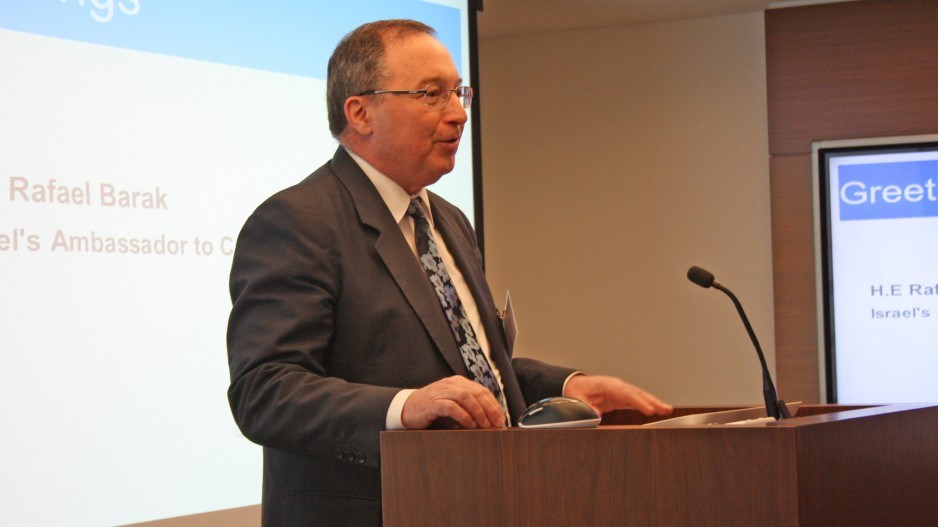Investing $10 million in research and development projects in the oil sector seemed like a “natural” fit for Canada and Israel when they launched a joint energy-science technology fund in 2012, according to Uzi Landau.
Back then crude oil was fetching about US$110 a barrel, and Israel was looking to develop its own natural resources, said Israel’s former minister of energy and water resources.
Flash forward to 2016: Victoria and Ottawa are looking to diversify the economy in the wake of plummeting energy prices, and Israel wants to expand its reach as a startup powerhouse into a city aching for more tech investment.
Israeli Ambassador Rafael Barak arrived in B.C. in February, holding meetings with Premier Christy Clark and Technology, Innovation and Citizens’ Services Minister Amrik Virk a month after the province launched a tech strategy that includes a $100 million venture capital fund.
During a February 17 speaking engagement at the Vancouver Israeli Tech Club (VIT) in the city’s downtown, the diplomat told the audience his embassy is working with Canada’s National Research Council to develop joint programs that bring together startups from both countries.
“I hope that Mr. Virk will have also the opportunity to have a program within British Columbia in which we will be able to support these wonderful and important entrepreneurs we have in this beautiful city,” Barak said, referring to other joint programs in Alberta, Saskatchewan and Ontario.
Barak told Business in Vancouver the goal of his visit is to kick-start bridge-building between the tech sectors in Israel and B.C. – a province his own country has looked to in the past mostly for natural resources.
At eight million, Israel’s population is a little less than double B.C.’s, but Tel Aviv, having spawned the Waze GPS service, Viber’s voice-over-Internet protocol service and the ICQ instant messaging program from the 1990s, is considered one of the world’s top startup centres.
Compass, a U.S.-based business intelligence service, ranked Tel Aviv as the world’s fifth-best city for startups behind San Francisco, New York, Boston and Los Angeles.
The company’s 2015 Startup Genome report based its criteria on a city’s access to funding, market reach, exit values and growth prospects for early-stage technology ventures.
Vancouver came in at No. 18.
But recreating a tech community similar to Israel’s is unlikely to be in the cards for Vancouver, according to entrepreneur Yossi Vardi.
In fact, it would be tough to recreate it anywhere else, the angel investor behind ICQ told the audience following Barak’s remarks.
“You just have to bring three million Jewish mothers, 1.4 billion people who don’t like you [who are] put around you, and then you replicate,” he said, prompting big laughs from the crowd.
Vardi said Tel Aviv’s success in the tech sector is mostly a result of a unique cultural upbringing and mandatory military service that help entrepreneurs figure out who they can get along with under stressful circumstances.
While this allows startups to thrive during the “chaos” of the early stages, he said it’s a different story when companies have to scale.
“You need processes, you need structure, you need layers, you need authority, you need to respect management – doesn’t exist in Israel,” he said, prompting more laughs.
Yaron Bazaz, who co-founded VIT with Eran Elizur and Ronen Tanne, said Vancouver’s Israeli community is relatively small – numbering about 2,500.
But he said there is tremendous potential to build bridges between Israeli entrepreneurs in Tel Aviv and expats in the Silicon Valley unaware of Vancouver startups.
“The stream of talent and financing could work in two ways,” he said. “They could decide to invest here or expat Canadians could decide they’d like to live and work in Tel Aviv for a few years.”
He said either scenario is unlikely to come to fruition without further outreach between the two communities.
B.C.’s exports to Israel amounted to just $7.5 million in 2014, according to BC Stats.
Only Prince Edward Island, New Brunswick, and Newfoundland and Labrador exported less to Israel than B.C. did.
While Barak told BIV he was looking to entice more Canadian investors to put money into Israeli tech startups, Vardi said he still has his ear to the ground when it comes to putting money into any startup.
But before he invests, Vardi said he always considers three factors: the founders’ passion for their product, their attitudes toward over-funding (he’s not a fan) and their startup’s talent.
“I understand there’s a lot of talent in Vancouver.”
@reporton



